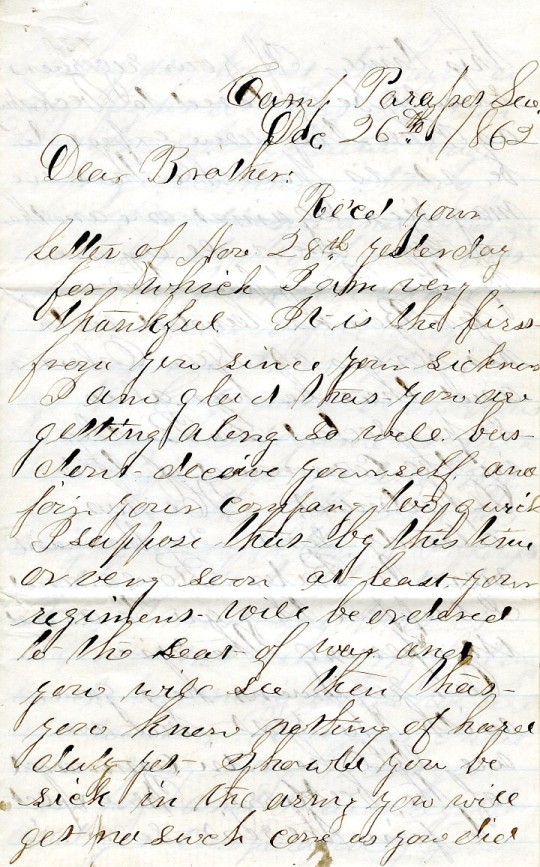It rather looks like Jerry has written 1862 instead of 1863 on this letter, but we know from what he talks about that it is 1863. On March 21, 1863, General Nathaniel P. Banks sent the 6th Michigan Infantry to destroy a bridge at Ponchatoula,¹ Louisiana, and they spent several days getting there and sacking the town before burning a railroad bridge near Ponchatuala on March 25. Although Jerry mentions that “our troops” captured “a large amount of rebel cotten [sic] and army stores,” according to historian John D. Winters in his book The Civil War in Louisiana, Colonel Thomas S. Clark of the 6th Michigan was “disappointed to find no cotton in Ponchatoula.” He did gather all the mules, wagons, turpentine and resin, along with the plunder from the village, and loaded it aboard waiting schooners.²
The original letter is in the Jerry E. Flint Papers (River Falls Mss BN) at the University of Wisconsin-River Falls, University Archives and Area Research Center.
Camp Parapet La.
Apr. 2nd 1863
My Dear Mother ;
I feel a little lonesome to night — so I have made up my mind to have a short chat with you. I presume that it will not be very interesting, for I have not the faculty of enjoying this silent mode of communication well enough to arouse in me the spirit of conversation. I can however let you know that I am at present in very good health, and trying still to do my duty faithfully as a soldier.
The prospect of crushing this rebellion sometimes looks dark and it seems as though we made but little progress. Still I am not yet willing to doubt our final success. If our people at the north were half as united against the rebels as they are against us, I should be out of this hot southern climate in less than six months.
As far as I am concerned I have stood this climate uncommonly well, and but for the Fever and Ague which has a strong hold of my system I would be as well as ever in my life. I have a spell of this once in about three weeks. My chills are not very hard but the fevers are awful. They make me almost crazy. The doctor has given me a solution of Arsenic and some thing else I don’t know what. I have taken so much quinine that it don’t have much effect.
I was very glad to hear that you had taken a trip to Dover. I have no doubt you had a splendid visit with Aunt Persis. I would like to hear from Berridge and Bunyan. I hope they have enlisted.
Our troops here made a dash over the head of the lake a few days since and were successful in capturing the town of Ponchitowla [sic]¹ and a large amount of rebel cotten [sic] and army stores. We hear rumors that Gen. Butler [Benjamin F. Butler] is to be sent again to this department. I hope it is true as do all of his old troops. With him would come confidence and a new and energetic spirit to the army here. When he issues an order the rebels in New Orleans know that it must be obeyed. As for Banks they care no more for him than they do for a street urchin.
I would send you some money but if I had it but we have not been paid off for nearly four months so that of course I am strapped. I shall expect a letter from Phineas by the next steamer.
Do you ever hear anything from Whitefield. I feel anxious to know where he is, though I suppose that he cares little whether we know anything of him or not. Give my love to all the folks.
Yours Truly,
P.S. I forgot to tell you that six of us had built us a small shantie [sic] 10×12 and are now living in it. It is much more comfortable than tents.
1. Ponchatoula is located half way between New Orleans and Baton Rouge. Jerry seems to be spelling it phonetically.
2. The Civil War in Louisiana, by John D. Winters, [Baton Rouge]: Louisiana State University Press, 1963. The incident at Pontchatoula is described on pages 219-20. This book is available in the UWRF Library (E 565 .W54).




